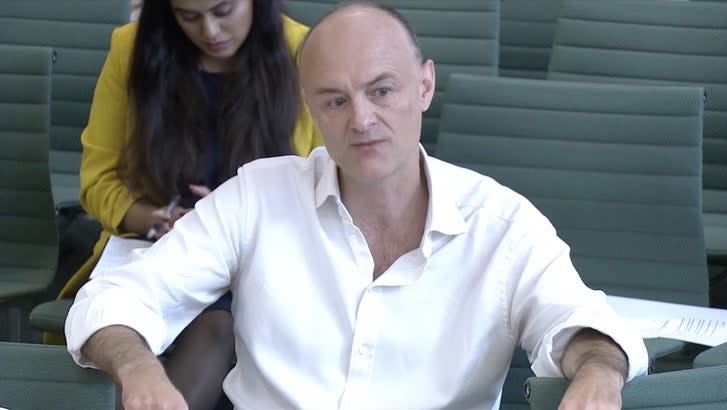As a psychologist, I can tell you that Dominic Cummings is an enemy that few would wish to cross

The former advisor to Boris Johnson, Dominic Cummings, appeared at a Health and Social Care Committee hearing on Wednesday
(REUTERS)For a man undergoing a national, and very public grilling on one of the most controversial and divisive situations that the UK has ever experienced, from my professional opinion as a psychologist it would appear that Dominic Cummings seemed unnaturally comfortable.
Even the relaxed open-collared white shirt he chose to wear during his inquiry yesterday (26 May) seemed more fitting for a casual meal out with friends, as opposed to discussing an alleged national catastrophe – and one that he was very much a part of.
It was worryingly easy for Cummings to betray Boris Johnson, the man who once employed him as a close ally, and who invited him into his circle of trust. To the less discerning viewer, his apparent openness may perhaps wrongly be interpreted as transparency, authenticity, and even honesty. But practising for 23 years as a registered psychologist therapist, with a BSc in psychology, an advanced diploma in therapy, a masters in integrative therapy and 14 years experience as a media psychologist, I have a few observations.
In cases where someone so effortlessly offers up damning anecdotal information, it is potentially less about stating facts, and more about positioning themselves as the perfect sniper, seeming to carefully assassinate every single layer of their perceived enemy, a deeper and more discerning analysis is required.
At every single point when questioned during Wednesday’s inquiry, he was very much in charge. He appeared not to see this as an interrogation, and he appeared to feel firstly in control, and secondly superior to those requiring his responses. While initially, his body language was closed, as he became more comfortable with his performance, his open posture, in my opinion, betrayed him – becoming both emotionally and literally laid back in his chair was at complete odds with the content of his conversation, particularly in regard to his own responsibilities and failures where the Covid strategy is concerned.
At every single opportunity, he carefully offered his analysis of certain important players, and he was clever in his tactics, using first names where Chris Whitty and Patrick Vallance were concerned, casting these as the heroes in this unravelling, and suggesting that he held a “closer” relationship with these apparent “good guys”, while he simultaneously dismissed professionals like Professor Carl Heneghan, and Sunetra Gupta – two highly accomplished experts in their fields – as if their views were irrelevant, dangerous even. To me, as a psychologist, this offers further insight into his feelings of superiority and righteousness in regards to his own behaviour.
While he did apologise for the role that he played, this apparently heartfelt statement fell short due to his constant blame of others. To be truly responsible and accountable for one’s own actions, it is essential that personal culpability is fully acknowledged. Instead, Cummings constantly rationalised that he was entirely powerless and beholden to an out of control, chaotic and personally irresponsible prime minister, and in particular the health minister.
Yet, there was a flaw in his own argument towards the prime minister, as by Cummings’s own admission, Boris Johnson didn’t wish to lock down at all. Instead, he saw the long-term potential catastrophe on the economy as a bigger burden for society to bear. Yet, Johnson did lock down – again, and again – which makes little sense if he was indeed the chaotic megalomaniac Cummings would have you believe.
When he suggested wanting a “dictator” with “kingly authority” to oversee the Covid crisis, it seems to me he was likely referring to himself. His judgements of most of those who surrounded him were full of contempt, and while it is possible that Matt Hancock could have made huge errors of judgement and failures that will be exposed, the vitriol that Cummings had towards him seemed personal, as opposed to professional.
There is absolutely no doubt that Dominic Cummings is a master of spin, brilliant at his work and an enemy that few would wish to encounter. He portrayed himself as a victim of circumstance and a good man who found himself silenced by a foolish leader, and while each will come to their own conclusion as to his integrity, it is always worth asking oneself if, placed in a similar position, would you be so willing to potentially destroy those you once counted as close colleagues and friends with such ease?
Lockdowns remain a contentious issue, their impact will be felt for generations to come and their effectiveness in the scientific world is still being fiercely debated, meaning that whatever Dominic Cummings’s personal feelings are, they are not enough to cast Johnson as the villain.
Emma Kenny is a psychological therapist (MBACP)
Read More
Matt Hancock has questions to answer – but transparency is a flexible friend for this government
Think what you like about Cummings, his testaments are based on the realities we remember
Cummings once advertised for ‘weirdos and misfits’ to join him – now we see why

 Yahoo Finance
Yahoo Finance 